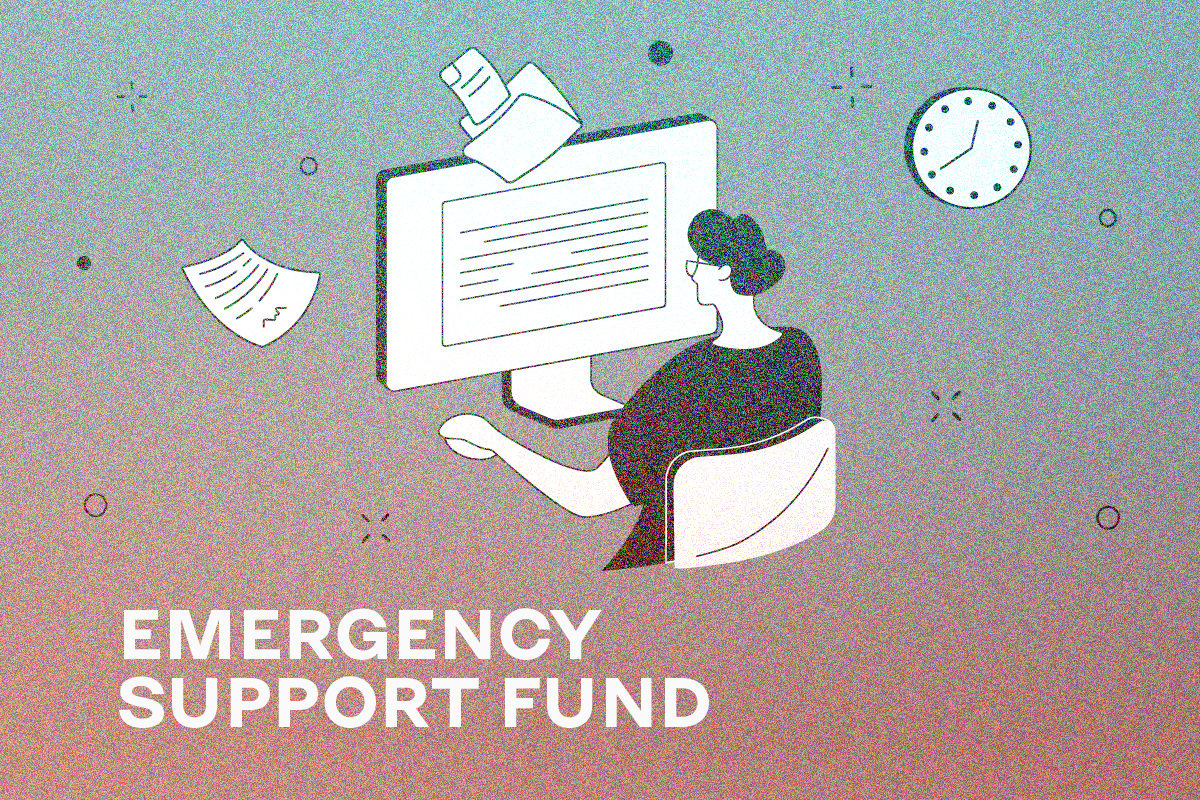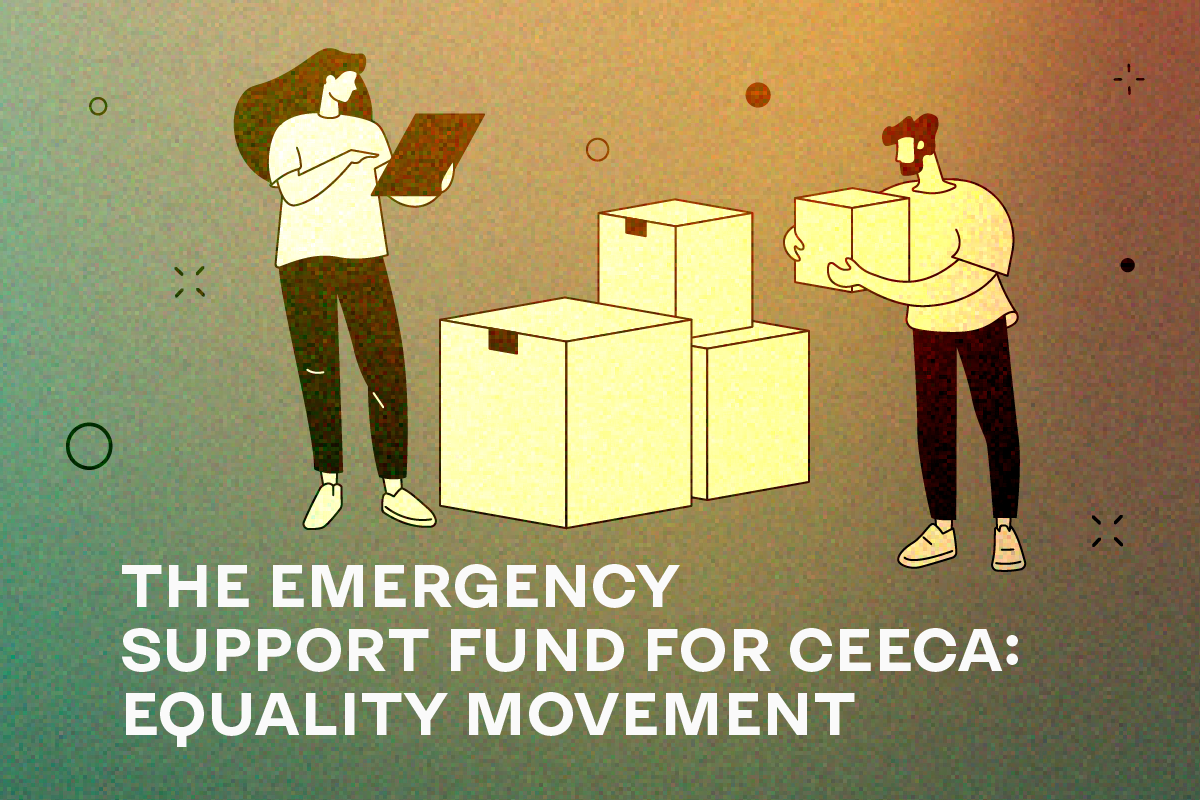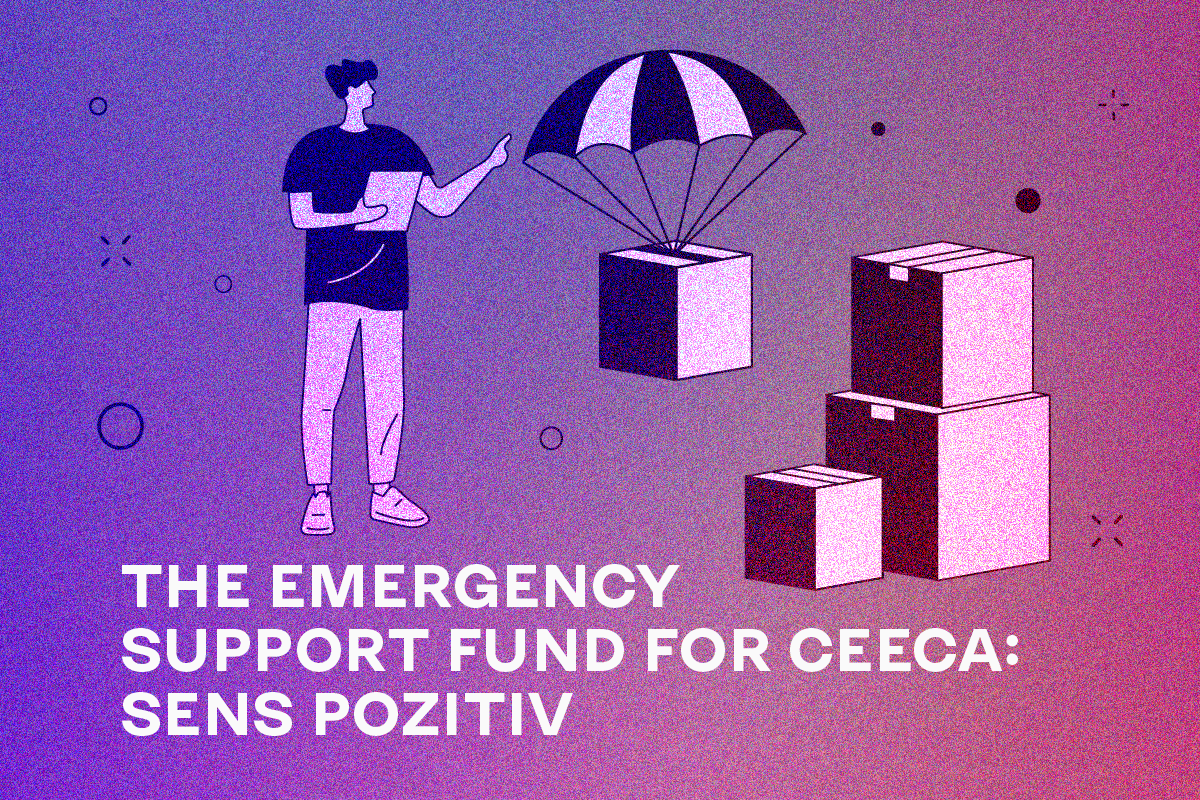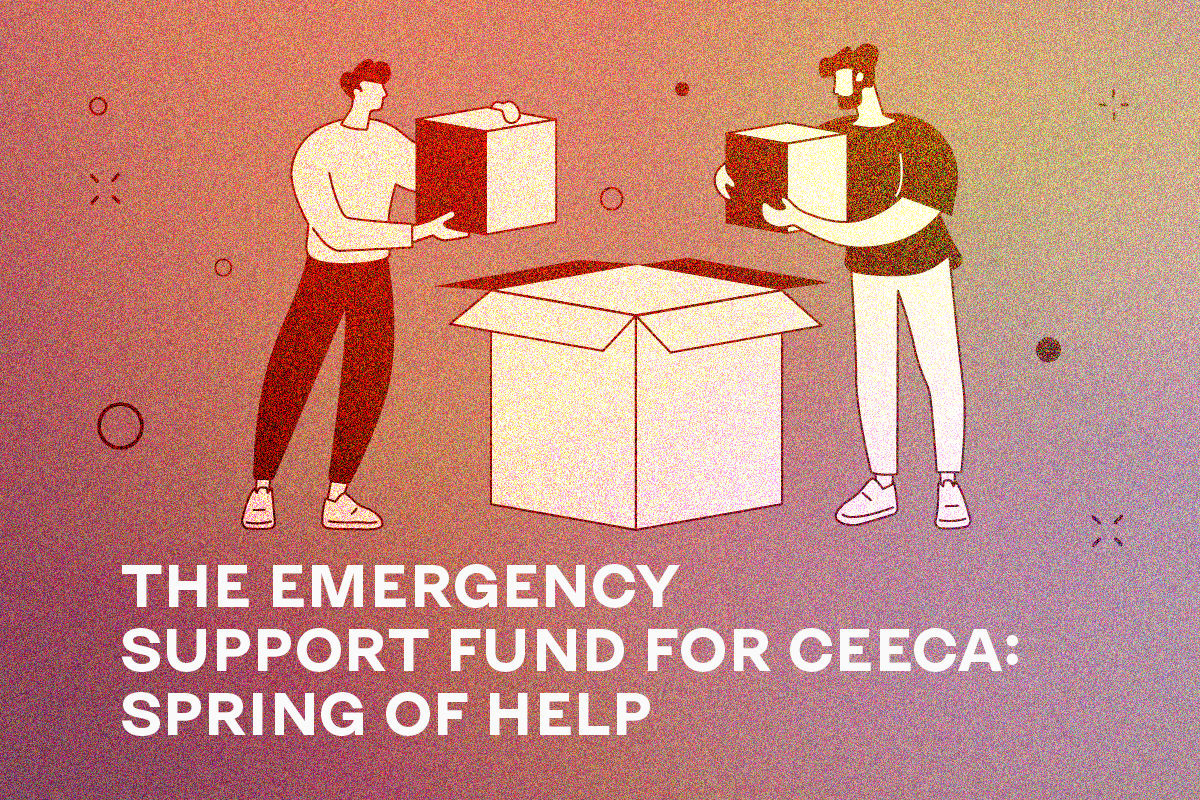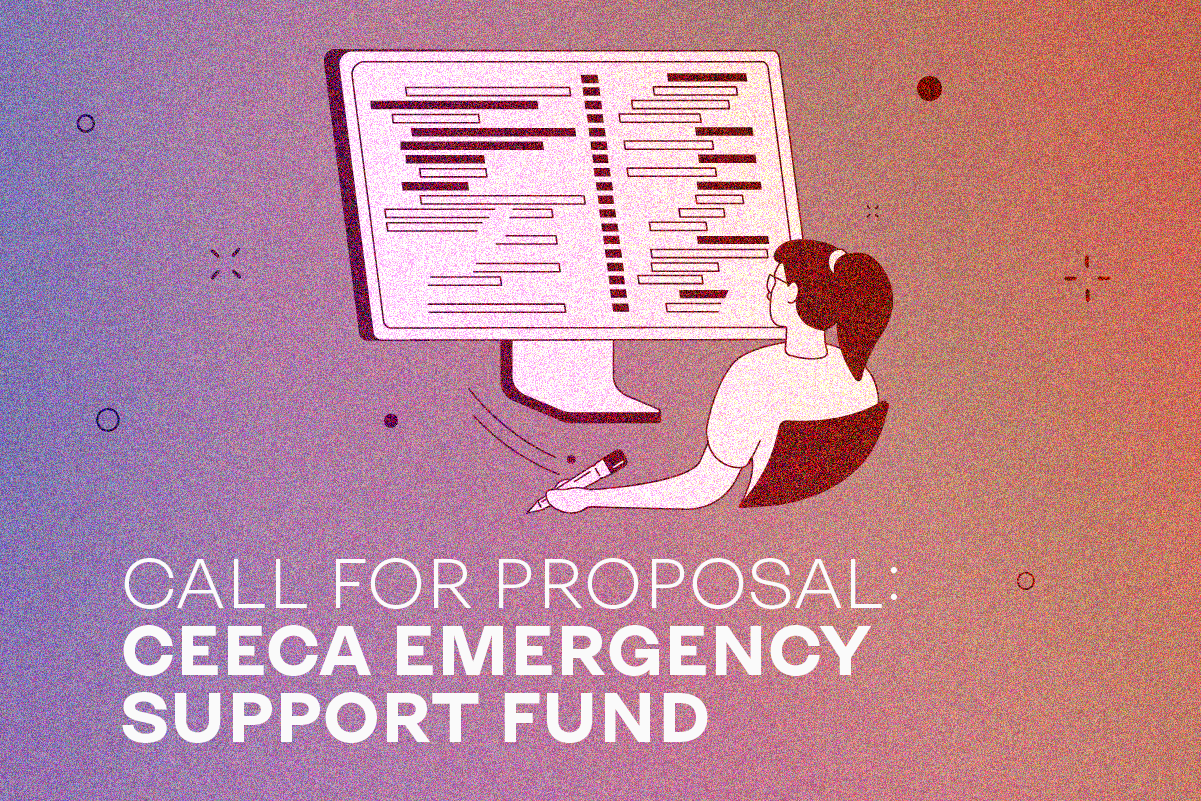Текст українською мовою доступний у додатку до цієї новини.
EMERGENCY SUPPORT FUND
Third Grants Competition for Initiatives in CEECA—2024
ECOM – Eurasian Coalition on Health, Rights, Gender and Sexual Diversity in partnership with the organizations “Aidsfonds” (Netherlands) and ICF “Alliance for Public Health” (Ukraine) is implementing a program aimed at reducing the negative impact of the Russian war against Ukraine on the access of key populations (KP) to HIV services and humanitarian assistance in the region of Central and Eastern Europe and Central Asia (CEECA).
The program includes the provision of grants to support initiatives of communities of KP aimed at ensuring the access of KP to HIV-related services, protecting the rights of KP, overcoming discrimination and stigmatization, as well as at ensuring the access of KP to humanitarian assistance.
As part of this program, ECOM is announcing a third call for proposals for organizations and unregistered initiative groups led by communities of KP vulnerable to HIV in CEECA countries (except Ukraine).
TRACKS SUPPORTED UNDER THE CALL FOR PROPOSALS:
- Self-organization of communities in migration
- Providing services for key populations in migration
- Removing political barriers to the “legalization” of migrants affected by HIV and their access to social or health services
- Establishing and/or maintaining measures to amend and/or mitigate the impact of existing laws and procedures and to respond to new legislative initiatives that contribute to harassment and discrimination against people living with HIV and key populations
WHO MAY SUBMIT PROPOSALS
As part of this call, ECOM invites proposals from community-based non-governmental organizations and initiative groups of key population communities from the following countries of Central and Eastern Europe and Central Asia:
Azerbaijan, Armenia, Estonia, Georgia, Hungary, Kazakhstan, Kyrgyz Republic, Latvia, Lithuania, Moldova, Poland, Romania, Slovakia, Tajikistan, Turkmenistan, Uzbekistan.
The call for proposals will give priority to community-led non-governmental organizations and initiative groups.
Activities within the Fund, aimed at supporting key populations in Ukraine, are carried out by the ICF “Public Health Alliance”. Additional information is at the link.
Programs operating in Russia and Belarus are not supported under this competition.
ECOM grantees implementing projects from the first and second rounds of the competition cannot apply to this call! Organizations that do not have current grants with ECOM or organizations that have completed grants with ECOM may reapply.
BENEFICIARIES OF THE GRANTS COMPETITION
- People living with HIV (PLHIV) and people affected by tuberculosis;
- Trans people;
- LGBT people and men who have sex with men (MSM);
- Sex workers;
- People who use drugs (PWUD);
- Women living with HIV;
- People with disabilities;
- Adolescents and young adults are vulnerable to HIV.
Proposals that include intersectional work with different KP are welcome.
ACTIVITIES
Proposed projects may include (but are not limited to) the following activities aimed at representatives of key populations who have found themselves in migration as a result of the Russian war against Ukraine:
1. Self-organization of communities in migration:
- Organizational development of KPs, including NGO registration, development of statutory documents, etc.;
- Capacity building of key populations organizations for work with KP in migration;
- Needs assessment as a tool for advocacy;
- Collection of data on stigma, discrimination, and human rights violations;
- Advocacy activities, including media campaigns, working meetings, etc.;
- Educational activities, including with decision-makers (seminars, workshops, trainings, development of training manuals, etc.).
2. Providing services for key populations in migration
HIV services and other healthcare services:
- Ensuring that KP who are migrating as a result of the war have access to HIV services, including case management and outreach, referrals;
- Community-led monitoring;
- Procurement of hormonal drugs for hormone therapy for trans people;
- Increasing access of KP to other friendly healthcare services: informational services, referrals, and organization of counseling: for example, on medical research, mental health, substance abuse, and reproductive health.
Mental health and combating violence:
- Provision of emergency psychological assistance services;
- Assistance for victims of physical, sexual, psychological, emotional and other kind of violence, etc.;
- Organization of and/or support for the work of shelters;
- Organization of rehabilitation camps (socio-psychological rehabilitation) for representatives of KP and their families;
- Prevention of violence: self-defense courses, mini-trainings on what to do in dangerous situations.
Social issues:
- Services for finding and providing temporary housing for KP who are migrants;
- Assistance in finding employment: consultations with professional recruitment agencies, professional retraining, organization of professional courses (IT, design, etc.) with subsequent employment;
- Services for legal support for the restoration of identity documents for KP, who are migrants.
Meeting urgent needs of KP and their families:
- Purchase of food, food certificates; purchase of medicines (except ARV therapy); purchase of clothes and hygiene products.
3. Removing political barriers to the “legalization” of migrants affected by HIV and their access to social or health services:
- community-led monitoring;
- collection and systematization of data on access to social or health services in the host country;
- analysis of existing political barriers that prevent the “legalization” of migrants and subsequent advocacy to eliminate them;
- informing the representatives of the KPs about the legislation and procedures of the host country and their participation in the advocacy of changes.
4. Establishing and/or maintaining measures to amend and/or mitigate the impact of existing laws and procedures and to respond to new legislative initiatives that contribute to harassment and discrimination against people living with HIV and key populations:
- reviewing legislation and procedures that promote harassment and discrimination against people living with HIV and key populations, and advocating for change;
- creation of intersectoral coalitions of the KPs of the population and other vulnerable groups, with the aim of mitigating the impact of existing laws and procedures, as well as responding to new legislative initiatives;
- conducting campaigns at the national level to mitigate the impact of existing laws and procedures, as well as responding to new legislative initiatives.
The following types of activities will not be funded:
- Individual participation in seminars, conferences;
- Purchase of ARV therapy;
- Subcontracting other organizations to carry out activities (other than fiduciary agents of unregistered initiative groups – see below).
GRANT PERIOD AND BUDGET
Small grants up to €15,000 for a period of 3 to 6 months with two reporting periods and two tranches proportionally divided between the implementation period starting 1 April 2024 for:
- Track 1 (self-organization of communities in migration).
Medium grants up to €25,000 for a period of 6 to 9 months with two reporting periods and two tranches proportionally divided between the implementation period starting 1 April 2024 for:
- Track 2 (Providing services for key populations in migration),
Big grants up to €50,000 for a period of 9 to 12 months with two reporting periods and two tranches proportionally divided between the implementation period starting 1 April 2024 for:
- Track 3 (Removing political barriers to the “legalization” of migrants affected by HIV and their access to social or health services)
- Track 4 (Establishing and/or maintaining measures to amend and/or mitigate the impact of existing laws and procedures, and to respond to new legislative initiatives that contribute to harassment and discrimination against people living with HIV and key populations).
IMPORTANT: Proposed projects can only be submitted to one of the areas. If an application is received with activities aimed at several areas at the same time, the application will not be accepted for consideration.
One organization can submit only one project application and only for one of the areas. If two applications are received from one applicant, both will not be accepted for consideration.
LIST OF DOCUMENTS NECESSARY TO APPLY
Applicants must submit a complete set of documents online at the link.
The set of documents should include:
For NGOs:
- Completed online application form
- Attachment: Project work plan and project budget (according to the provided form)
- Attachment(s): Document(s) confirming the legal status of the organization: certificate of registration, statement from the unified registry, certificate of non-profit status, charter, etc.
For initiative groups:
- Completed online application form
- Attachment: Project work plan and project budget (according to the provided form)
- Attachment(s): Document(s) from a partner NGO confirming legal status of the organization: certificate of registration, statement from the unified registry, certificate of non-profit status, charter, etc.
- Attachment: Letter of support from a partner NGO
- Attachment(s): Confirmation of the activities of the initiative group for at least six months.
Important note for initiative groups:
- Only initiative groups with a documented history of activity of at least six months can be supported.
- In order to submit a project proposal, the initiative group requires a registered partner organization that will take on the functions of a fiduciary agent, including financial management and reporting on the grant. Please attach a letter of support from a registered NGO or partnership agreement stating that it will provide full support to your initiative group for the implementation of the project.
SELECTION CRITERIA
Proposals will be considered based on the following criteria:
- The applicant is a legal organization or an unregistered initiative group established with the participation of representatives of key populations and located in one of the following countries of Central and Eastern Europe and Central Asia: Armenia, Azerbaijan, Estonia, Georgia, Hungary, Kazakhstan, Kyrgyz Republic, Latvia, Lithuania, Moldova, Poland, Romania, Slovakia, Tajikistan, Turkmenistan, Uzbekistan;
- The meaningful participation of communities in the activities of the organization has been confirmed (representatives of key populations are among the employees and/or members of the organization or board; the statutory and strategic documents of the organization indicate representatives of at least one key population as a target group/one of the target groups, etc.);
- The applicant has a mechanism that ensures quality and transparent financial management (using its own systems and procedures, or there is a fiduciary agent that will ensure the necessary quality of financial management);
- The objectives of the proposed project correspond to the purpose of the call for proposals and fall under one of its tracks;
- The budget is in line with the proposed activities;
- The project proposal is well planned (SMART criteria apply);
- Full contact information for persons authorized to sign documents on behalf of the organization is provided.
STAGES OF THE GRANTS COMPETITION
The grants competition will run from February 14 to March 4, 2024. It will be conducted in three stages:
(1) Submission of proposals
4 March 2024 is the deadline for submitting proposals.
One organization may only submit one project proposal.
ECOM staff will check that the proposals meet the technical requirements. Only those proposals that meet the requirements will be accepted and registered.
(2) Review and selection of proposals
March 4-15, 2024: Proposals are reviewed by a panel of independent experts. The experts’ recommendations regarding the selection of recipients will be considered and approved by ECOM’s Steering Committee. All applicants will be notified of the final decision. ECOM reserves the right not to indicate the reasons for refusal.
(3) Negotiations and signing of contracts
March 15-30, 2024 — announcement of the results and detailed negotiations on the grant agreement: discussion of the terms of the contract, work plan and budget for grant recipients, and conclusion of the agreement.
PROCEDURE FOR SUBMITTING PROPOSALS
- Proposals must be submitted online in Russian or English at the link.
- Include all necessary attachments.
- The “Project Work Plan” and “Project Budget” templates are available as attachments to this call.
Only complete sets of documentation will be accepted.
ECOM reserves the right to require applicants to submit additional documents and information to substantiate or clarify the data specified in the proposal.
WEBINAR ON PARTICIPATING IN THE GRANTS COMPETITION
ECOM will hold a webinar for everyone who wishes to participate in the grants competition and has additional questions. During the webinar, information will be provided about the grant competition and filling out the required forms.
The webinar will take place on February 21, 2024, at 11:00 EET. You can register for the webinar here.
Questions about the call for proposals should be sent to Suleyma Kelgembayeva at suleyma@ecom.ngo.
Technical questions about filling out the application form should be sent to Natalia Bikashvili at natalia@ecom.ngo.
The deadline for submitting proposals is March 4, 2024, 23:59 EET (Eastern European Time).
The regional program is implemented with the financial support of GILEAD.



